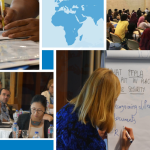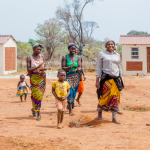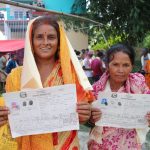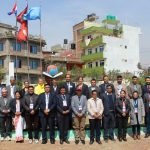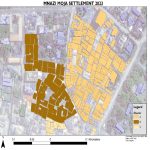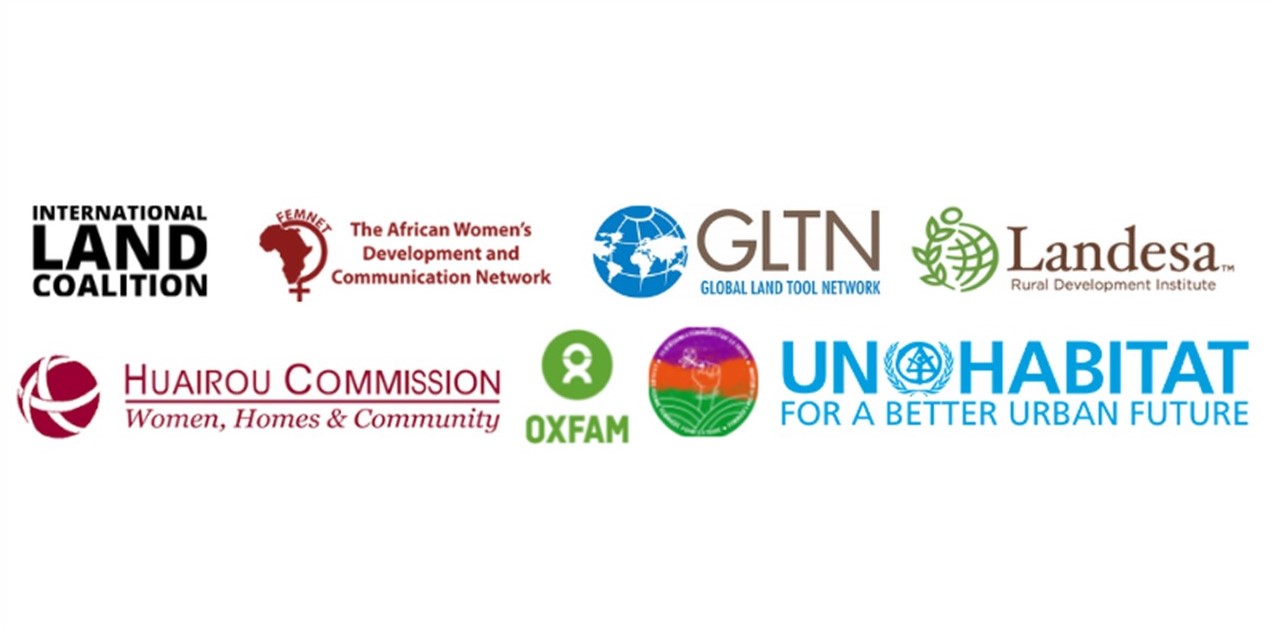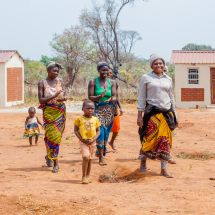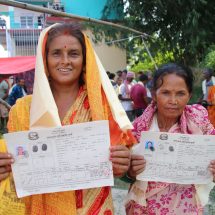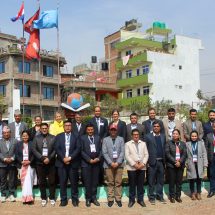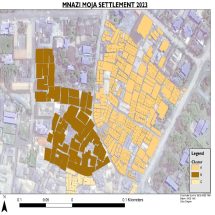As actors committed to achieving the SDGs and keen not to leave anyone behind, we[1] will work together to secure land, housing, property (HLP), biodiversity and natural resource tenure rights and participatory land governance for 100 million rural, urban, grassroots , indigenous women and youth; and together, will partner to collectively advocate for recognition of these rights as a foundational condition for achieving gender equality, economic justice, adequate housing, climate action, land degradation neutrality, peace and stability. We are committed to empowering rural, urban, grassroots, indigenous, women-led and community-based organisations living in poverty, and with land, housing and property insecurity; we recognise this requires us to share power and resources ourselves, as we ask others to do the same. We are committed to mobilise, partner and build synergies with other stakeholders towards development of the implementation plan and delivery of this commitment.
These efforts aim to fulfil existing international agreements, frameworks and conventions (2030 Agenda, New Urban Agenda, Voluntary Guidelines on the Responsible Governance of Tenure, Rio Conventions (and associated Gender Action Plans), UN Declaration on the Rights of Peasants, International Covenant on Economic, Social and Cultural Rights, Protocol to the African Charter on Human and Peoples’ Rights on the Rights of Women in Africa, African Union Agenda 2063, Kilimanjaro Rural Women Charter of Demands, and others.
To achieve this, we commit to take the following actions:
Civil Society:
- Serve as active participants in tracking how Action Coalition activities (in the Global Accountability Framework) will uphold and advance HLP rights for women, youth, and indigenous peoples including building on existing initiatives such as Land Rights Now, Kilimanjaro Initiative, Stand for Her Land Campaign, and related interventions.
- Mobilize civil society actors across relevant sectors (grassroots women, youth, farmers, indigenous rights, land, environment and climate activists, women/feminist movement) to generate and share sex-disaggregated data, capacity, knowledge, and resources to empower grassroots and indigenous women and girls, and to address and redress discriminatory gender power relations to achieve shared goals.
- Work closely with customary/traditional and religious authorities toward securing tenure rights for women and youth within customary tenure regimes, laws, and practices.
- Promote and support integrated approaches to rural, peri-urban, and urban land use planning and management for sustainable, inclusive, safe and resilient land, housing and property and natural resource rights for all especially for rural and indigenous women, youth and the urban poor.
- Integrate gender and land rights for women and youth in programming land degradation neutrality, addressing climate change, sustainable food systems and biodiversity restoration through, policy influencing, research and advocacy.
- Develop women centred programmes that enhance the knowledge and skills of particularly grassroots and indigenous women on their land rights while nurturing the principles of shared benefits, shared burden, and shared responsibly at the community level.
- Mobilize civil society actors and policymakers across sectors, customary/traditional and religious authorities to roll out campaigns for women’s land rights at the grassroots level.
Governments, Regional and Sub-Regional intergovernmental Institutions/Bodies and Traditional/Customary Land Authorities:
- Regularly generate, report, and use sex-disaggregated land statistics for gender responsive policy decisions and tracking progress on women’s HLP and natural resources rights for accountability at all levels.
- Report against relevant SDG indicators on land governance and women’s equal right to land and land tenure security to accelerate progress and improve monitoring systems.
- Facilitate and secure equal representation of women and youth leadership in land governance, management, restoration and administration structures and programs at all levels, especially for women and youth in rural and indigenous communities.
- Provide legal recognition for legitimate tenure rights, including customary and indigenous tenure regimes; with efforts to address gender inequalities in access, control and ownership of land and natural resources; and where appropriate through individual, and joint spousal land titling programs; and investments in equitable and affordable housing.
- Adopt and implement COVID-19 recovery strategies that are gender-responsive and recognize the foundational importance of secure land tenure and responsible governance for a sustainable and resilient future.
- Adopt and implement COVID-19 recovery strategies that address land restoration as a condition to overcome climate and biodiversity crises, while creating opportunities for women and men
- Invest in equitable use and benefits from digital technologies in land administration and restoration for women and youth in particular from grassroots and indigenous communities, to make land governance and administration services more accessible, affordable, effective, and equitable for all.
- Facilitate access to key policy decision-making spaces (formal and customary) for rural , grassroots and indigenous women and youth to fulfil rights to participation and drive accountability for actions that undermine or limit the realization of strong HLP and natural resource rights.
- Facilitate access to justice for women claiming and defending their land rights including inheritance rights.
- Take legislative and other measures including affirmative action to redress disadvantages suffered by women and girls; provide incentive to promote, recognize and protect women and youth land rights such as tax incentives etc.
- Prioritize women organizations as key partners for the implementation of land related projects, including land restoration and increase the envelope of resources directed towards women led businesses and projects.
- Facilitate meaningful engagement between government, private sector, and communities including women and youth representatives and leaders in rural and urban areas, embrace the application of free, prior, and informed consent (FPIC); promote zero tolerance for gender-based violence in investments and supply chains related to HLP biodiversity and natural resources; halt evictions without FPIC, and ensure adequate compensation and/or agreements on benefit sharing; and redress other negative impacts on women, local communities and the environment.
Multilateral, International Financial Institutions and Philanthropic Actors:
- Directly channel significant funding to rural, urban, grassroots and indigenous and women-led organizations and groups to secure HLP and natural resource rights for women and youth, protect ecosystems and restore degraded land, forests and other ecosystems.
- Provide adequate resources to support direct involvement of women, including grassroots women leaders and experts and female youth, in the implementation and monitoring of global conventions on climate change, combating desertification and land degradation, biological diversity, the United Nations Family Farming Decade (2019-2028) among others, to advance the role of women as key stakeholders; including use of evidence-based and gender-responsive monitoring of NDCs for accountability at all levels.
- Support land restoration projects that recognize equal use and ownership rights and prioritize women and youth as both beneficiaries and agents of change.
Private Sector Actors:
- Respect and comply with all human rights principles related to housing, land and property, and natural resources rights in line with existing international, sectoral, regional and national frameworks, standards, and safeguards (Universal Declaration of Human Rights, Convention on the Elimination of All Forms of Discrimination against Women (CEDAW), Nagoya Protocol, Voluntary Guidelines on the Responsible Governance of Tenure (VGGT), UN Guiding Principles on Business and Human Rights, Committee on Economic, Social and Cultural Rights General Comment No. 24, and Art. 3, and UN Declaration on the Rights of Indigenous Peoples).
- Go beyond existing standards as needed to apply an intersectional gender equality and social inclusion lens to ensure that women and youth equitably benefit and are not harmed in the context of investments in HLP and extraction of other natural resources, and that women are represented in decision-making as leaders and stakeholders.
- Make information pertaining to impact assessments, implementation, monitoring and impact evaluations of all forms of investments projects in HLP and natural resource extraction public in accordance with the highest applicable standards of transparency, upholding social and environmental safeguards in line with the VGGTs and respect for women’s human rights including their control over HLP and natural resources.
[1] Partners involved in the development of this commitment (Landesa, International Land Coalition, Huairou Commission, Oxfam, FEMNET, the Global Land Tool Network, UN-Habitat), supporting partners including UN agencies, governments, regional governmental bodies, CSOs, private sector, research and academia, multi-lateral organisations- all combined make this collective commitment.
The following stakeholders support this transformative commitment to women’s land rights to accelerate gender equality:
International Land Coalition
Landesa
GLTN and UN HABITAT
Huairou Commission
Oxfam
FEMNET
WEDO
International Fund for Agricultural Development (IFAD)
Global Femnist Land Platform
Chandler Foundation
King Philanthropies
We Effect
UNEP
UN Women
International Center for Research on Women
Habitat for Humanity International
Housing Land and Property Area of Responsibility (HLP AoR), Global Protection Cluster
University of Nairobi, Women’s Economic Empowerment Hub
Ethiopian Economics Association (EEA)
Action Aid Uganda
Action Aid Kenya
dRPC (development Research and Projects Centre)
UAF Africa (Urgent Action Fund)
Serve Tanzania Foundation
FIDA Uganda (Uganda Association of Women Lawyers)
UCOBAC Uganda
Rights and Resource Foundation (Liberia)
Community Self Reliance Centre (Nepal)
Social Development Foundation (SDF, India)
ASSOCIATION FOR LAND REFORM AND DEVELOPMENT (ALRD, Bangladesh)
National Federation of Communal Forest and Pastures of Albania
Lamosa (South Africa)
Alliance for Rural Democracy in South Africa
GenderCC Southern Africa
Women’s Environmental Network (UK)
Download:
Collective Women’s Land Rights Commitment (ENGLISH)
Compromiso colectivo de mujeres por los derechos a la tierra (SPANISH)


